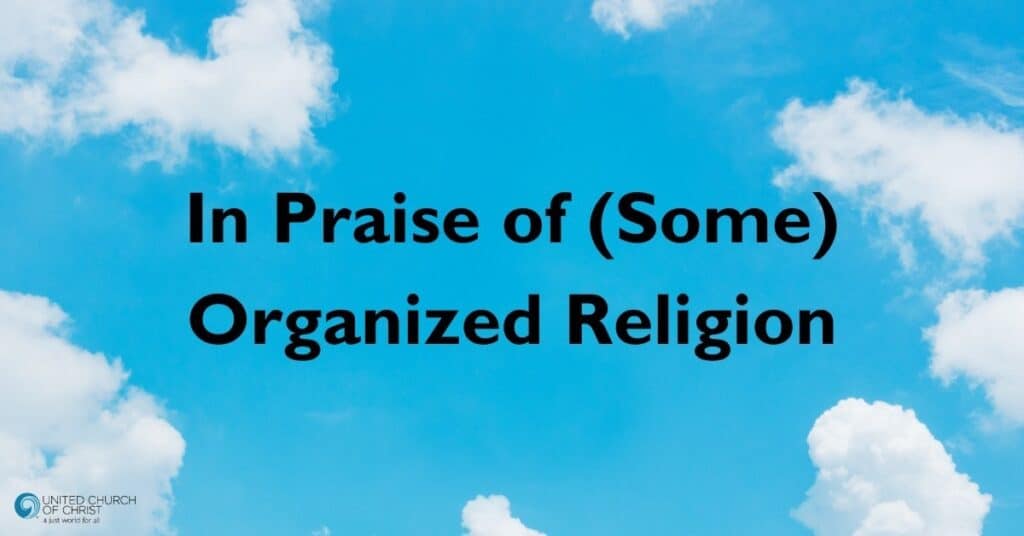In Praise of (Some) Organized Religion
A new report on spirituality in the United States was recently released by the Pew Research Center. It was greeted with the usual round of news stories about how “Americans have been abandoning organized religion in droves” while a growing group identifies as “spiritual but not religious.” Over the years, I have found that reports on this phenomenon often prompt an eruption of speculation and myths about the causes and implications of organized religion’s decline. As someone who works for an institution of organized religion that has deep historic roots, I have developed my own, perhaps contrarian, view of the situation.
Among my own band of steadily shrinking mainline Protestants, a common response to membership decline has been a sense that we are all on a slowly sinking Titanic. An existential anxiety is often reflected in coffee hour conversations about dwindling numbers in the pews and the graying hair of those present.
Over the years, some of our congregations have responded by endeavoring to adopt the practices of evangelical mega churches, regarded as successful in bucking the prevailing trends. Others have responded by criticizing some of those same mega churches for giving organized religion, as a whole, a bad rap for being intolerant, repressive, and oppressive. There is, however, another way to respond to the current state of affairs that is often ignored. That is to focus on the persistent and abiding potential of organized religion to effectively counter societal injustices in ways that bring hope and vitality to the life of faith.
I work for a religious organization that was central to giving birth to the environmental justice movement in the 1980s. As a starting place for thinking about the potential of organized religion, I like to quote the renowned climate activist, Bill McKibben. When McKibben is asked, “What can I do about climate change?” He typically responds, “Don’t be an individual.” I spend a lot of my waking hours figuring out what exactly is the best way for us not to be individuals. The first essential key is to be part of an organization. As political scientist Hahrie Han and others have observed, social change is much more than a viral moment of people showing up at a large protest. It involves people coming together over the long-haul with shared commitments and a sustained structure that can achieve goals not won overnight.
Not every organizational vehicle can operate on the scale needed to address problems as large as the climate crisis. Han notes that “the best movements can engage people at the local level, but they also extend all the way up to the national level.” There are certainly national environmental organizations like the Sierra Club that meet this criteria, but I would argue that organized religion has a far greater potential through the pervasive reach of historic institutions with deep roots in the urban, suburban, and rural communities of red, blue, and purple states.
The operative word here is “potential.” To quote Han again, successful movements are “the ones that have the resilience to adapt.” Religious organizations are not particularly known for this ability. After all, they are in the business of tradition. But among religious traditions, there is one that is capable of rising to the occasion, and that is the prophetic tradition, the tradition of Martin Luther King, Jr., and countless others who have been willing to challenge the status quo, not simply as individuals, but as part of far larger organizations and movements. Herein lies a promising hope, not simply for organized religion, but for the fate of humanity and our planet.
ABOUT THE AUTHOR
The Rev. Dr. Brooks Berndt is the Environmental Justice Minister for the United Church of Christ and the author of Cathedral on Fire: A Church Handbook for the Climate Crisis.
View this and other columns on the UCC’s Witness for Justice page.
Donate to support Witness for Justice.
Click here to download the bulletin insert.
Related News
Celebrating Diversity, Equity, Inclusion, and Accessibility
In the beautiful diversity of humankind, we are invited to celebrate diversity, equity,...
Read MoreThe Gifts of Advent
One of my favorite seasons of the year is Advent, which often falls on the first Sunday after...
Read MoreLand, Artifacts, and Ancestors Back
Imagine one of your great grandparents toiled over a hand-written, illustrated copy of the...
Read More
